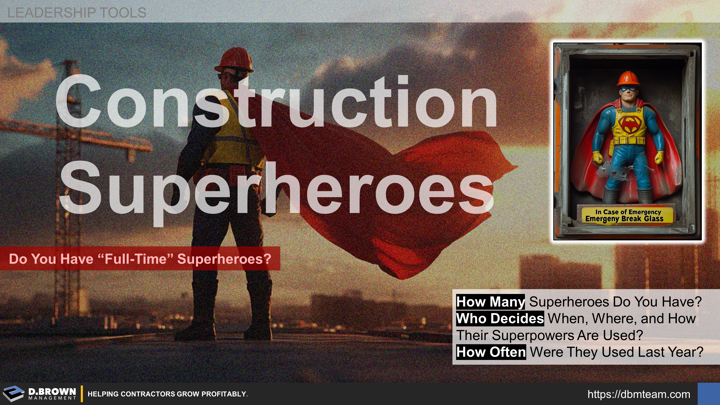If you are in the Starting Up stage of growth, you probably feel like a full-time superhero. That is what the business demands of you. As Marshall Goldsmith describes well, What Got You Here Won't Get You There.
As you grow the business, your own leadership capabilities, and your management systems, there are some other questions that you must be asking yourself.
Start by evaluating yourself and your current team, and what they could and would likely do if required:
- What percentage of your team is extremely dedicated and would work 20-50% longer than normal to get a job done? Not whether they are doing that now, but how many of them would? Take a good look at your current org chart and circle the ones that you know would put in that level of effort for at least several weeks when necessary.
- Of those, what percentage are in the "Superhero" category in terms of their versatility, productivity, or both? You know the type—the person who can single-handedly manage every aspect of a project, substantially replacing an entire project team? That lone estimator who can turn out 2-3X the work of everyone else? That person in accounting who knows how to do everything and can do 2—3X the work of others? Highlight those and make some notes.
Of your total headcount, what percentages are you looking at? 30% highly dedicated and 10% in the rare superhero category? Less? More? Why?
Next exercise—grab some different colored highlighters and pens:
- Which of those are currently working in that state of Overload (A) or "Superhero" (B) as described above?
- How long have they been working at that pace?
- Why are they working at that pace?
Do you have any full-time Superheroes or people that always work at Overload capacity?
Last part of the evaluation:
- Look at your outcomes—are you operating at industry benchmarks? 2—3X benchmarks?
- Run through the rest of the evaluation criteria for your current-state org structure and team, including succession readiness at all levels.
Here's the dichotomy of leading a growing construction contractor:
- If you don't have enough people who are both capable and willing to take heroic action when needed, it is very hard to navigate the messiness of growth, including challenging projects.
- If you have a high percentage of people constantly working at overload and superhero status, it is not sustainable or scalable. There will eventually be burnout and turnover at best. At worst, you will have a significant safety incident due to overload.
If you are the full-time superhero, take a moment to back up and look at the underlying reasons why.
Appropriate use of Overload and Superheroes
Leverage your management hierarchy and management systems, setting clarity around who decides to run the team at an overload pace or to "Break the Glass" and unleash one of the "Superheroes" to do what needs to be done. Remember that overload is one of the three enemies of lean operations.
Do a causal analysis on why this action was required and make adjustments to your systems if necessary.
Think about this as the project equivalent of going to unplanned overtime to solve a problem. With salaried team members, there is an even larger cost, although it doesn't show up in the weekly job cost report. Make sure you have appropriate workload management systems in place.
There are a lot more nuances to this, such as culture, that extend far beyond a single article.
The talent shortage is only compounding the problem.
If you want to discuss this further, please reach out.

